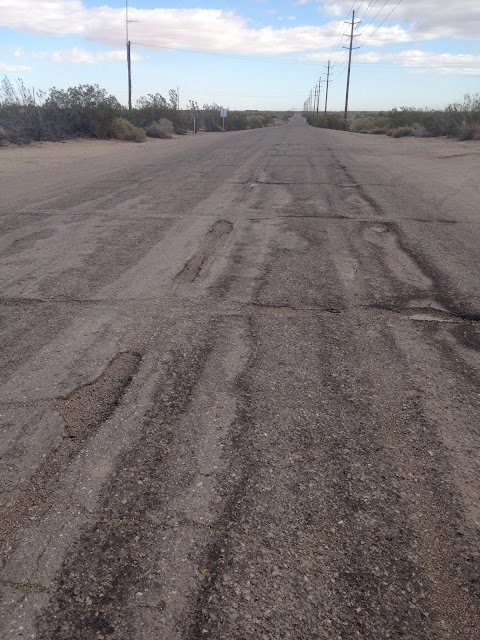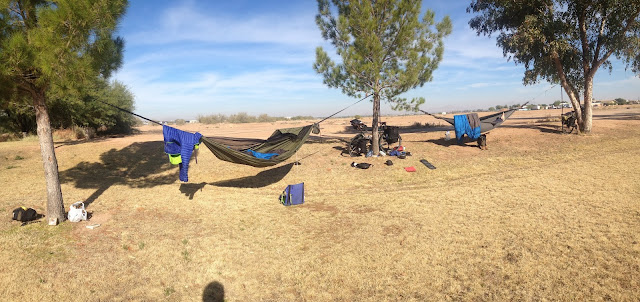Riding
our bikes onto the pier, down the ramp and into the sand, we let our bikes down
in a way possibly described in any way but gentle. They’re thrown into
the sand in a manner of accomplishment and completion. Without any notice of
who is around us, we strip down to our chamois, as socks and shirts go
flying in every direction. Bystanders on the pier must be very confused as to
what is going on, but we aren’t concerned. We’re in our own little bubble of
excitement. We look towards the ocean and run towards it, sore from days, weeks
and months of riding, but with all of it in distant areas of our minds. The sun is
further into its setting and only half of it remains as our toes first hit the
water. We trudge through the water until it overcomes our legs. With the next
wave, we dive in and seal the completion of our trip. I’ll never forget coming
out the other end of the wave, planting on the sandy bottom and pushing out
into the air with arms above my head. Yelling, splashing, sending out the call
my recently passed buddy and I shared for years, smiling and letting each wave
crash onto me with all its force. The last time we stood in the ocean was along
the rocky, lobster-laden shores of Maine.
We
now stand in the waters of the Pacific with memories and lessons that will
surely have an effect on the rest of our lives. As simple as it may sound, “We
did it!” is repeated between the two of us over and over again. We stand in the
ocean and look at our bicycles resting in the sand. They’ve been pedaled all
the way from the Atlantic, through sunny days, torrential downpours, windy
mountain roads and open plains. They’ve been the other half of the machine that
propelled us from A to B. More reliable than we were at times, our Surlys held
strong and weathered the storm we put upon them. One brief tune-up in
Knoxville, Tennessee and they carried us through the rest of the trip. The
significance of bicycles in my life is what drove my desire to embark on this
trip and I'm happy I chose this elegantly refined machine to share it with.
As
we walk out of the water towards our bicycles, I look over at Wes in
acknowledgment of the fact that he played the largest role in my experience
pedaling across America. Just as we are now walking out of the water together,
we were at each other’s sides every step and pedal of the way. We’ve helped
each other through every obstacle we faced, whether as big as a strained
Achilles tendon or simply being five miles from dessert while a craving kicked
in. Through different eyes and mindsets, we encountered and experienced the
same situations along the way. We often dealt with situations differently and
sometimes didn’t see eye to eye on the other person's method. Agreeing to disagree has
become something we’ve both become fairly skilled at, or at least more skilled at. We’ve overlooked the same
views, heard the same accents, tasted the same food, shared the same pitchers,
yelled through the same arguments and shivered through the same rainy days. We
now share a plethora of experiences, some too trivial, ridiculous or shameful for this
blog, but each of them defines our friendship with the other. I’ve learned
more from Wes than I have any other facet of this trip. My interaction with
him over the last five months has allowed me to gain a clearer image of who I
am, how I act, where I want to go in life and what is important to me. I will
never be able to thank him enough for such a gift.
When
it comes down to it, anybody can ride a bicycle across the country if he or she
is fortunate enough to have the obligation-free period that we did. Pushing down one
pedal stroke at a time, anybody can work into riding the small amount of miles
we rode each day. The true goal is completing it with a fellow traveler at
your side. Getting through moments of complete frustration with the other person
and still riding out of camp with them the next morning. Choosing not to
strangle them and instead respect the fact that their opinion is different than
yours. Being able to calm down, let time run its course, then sit in a
McDonalds and mash it out over a dipped cone. Accepting constructive criticism
and turning it into progressive development. It’s probably safe to say we’ve
frustrated and pissed each other off more than anybody else has done so throughout our lives. Still, we would come to the same conclusion at the end of each clash. Neither of us
would want to be on this trip with anybody else, let alone be able to even if
we did. I read this quote in the weeks leading up to the trip and have aimed to
live by.
"I would not waste my life in
friction when it could be turned into momentum." - Frances Willard
We
went into this trip after spending only six weeks around each other and even
then it was in a foreign country, where all rules and methods of interaction
are different from here in our home country. Standing on the shores of the
Pacific, the completion of our trip signifies being within 100 feet of each
other for the last 139 days straight. Hearing each other’s every word, idea and
rumbling snore for the last 3,336 hours. That is the true accomplishment for
me. I’m thankful to have started the trip with such an incredible person and now be ending
it with an incredible lifelong friend. I can’t wait until we want to rip the
other’s heads off on our next trip. You’re the man, Wes.
Care
for some numbers? Here’s my mathematically curious mind at work:
- 129 days between the first and last miles.
- ~4,300 miles
- 33.33 miles per day
- 13.5 mph average while riding
- 318.5 hours in the saddle
- 2.47 hours of riding per day. That’s it!
- 1,719,900 pedal rotations total, assuming an optimal cadence of 90 rotations per minute.
- 19 states crossed.
- More than 300 bamboozled animals and humans.
- ~20 inner tubes
- 3 pairs of lost sunglasses
- 1 citation from the National Park Service
- When Wes flies home, every 4 minutes he will travel the distance we did in 24 hours.
I’d like to thank everybody for all the immense support and necessary pushes throughout the trip. Those of you who helped us in times of need, your support will not be forgotten. You pulled us out of the soaking rain in Maine, gave us a ride after a tire was rendered unrideable, provided a shower after weeks of filth, pointed us in the right direction or helped us with access to tools, among many other acts of kindness. The Warmshowers website allowed us to meet people in their own element and refuel amongst the comfort of their families and homes. Each of the interactions we gained through Warmshowers was positive and often the most enjoyable experience within a region. I hope for, and look forward to, future interactions with each and every one of you, whether on or off a bicycle. Our families, and those close to us, were very patient with us the whole time, whether we deserved it or not. Thank you mama, Ashley, and many others, for grounding me when confused as to what the hell I was doing. My father, nicknamed “HQ” throughout the trip, was with us every step of the way via either phone or computer. He helped us in numerous times of need and seemed to always know the optimal next step. As the third member of our trip, the common joke was that he knew more about our trip than we did. All of you reading this were an integral part of the trip. You helped make the experience what it was while we simply did the pedaling.
In these last couple weeks following the trip, people
have begun to ask what I think the greatest advice for a trip like this would
be. There are really only a few things to be certain of, avoid and shoot for. Here
are my few basic guidelines:
- Always side with yes when faced with “Should we check out this river, restaurant, person, view or trail?” The answer is absolutely always yes. The miles and destination may seem important at the time, but they’ll be the smallest aspect of your trip in the end. Stop to take the photo, regardless of weather or time.
- Riding East to West really is against the wind, regardless of all the counterarguments you read to justify riding in that direction. It’ll be your greatest physical challenge. Either be prepared to ride against the wind for weeks on end or ride from West to East.
- High-quality racks are the most crucial piece of gear to put money and research into. They will make or break your day, time and time again.
- Most importantly, do not attempt this sort of trip with a fellow rider you has bamboo fenders. This is the only absolute rule, without any exceptions. If your travel partner shows up the first day with any bamboo components, have a large fire that night, throw them in the hot coals and watch the bamboo forever slip into the past. Your future self will thank you time and time again.
Get outside and ride your bike! You won’t regret it and will learn or see something new every time you do. You will experience your surroundings at the perfect speed. Whether riding to a neighbor’s house, the grocery store, a nearby town or across a state, you will see the route in a way you never saw by vehicle. If nothing else, trust me on this.

















































